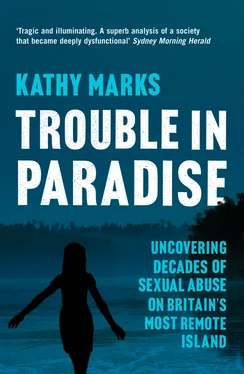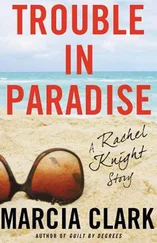Seventh-day Adventism replaced John Adams’ idiosyncratic brand of Anglicanism in 1876, after the American-based Church posted a box of literature to Pitcairn, then dispatched a missionary to argue its cause. The islanders were baptised in a rock pool, and since pork was now a forbidden food, they killed all their pigs—pushed them off a cliff, so the story goes.
Adventism, an evangelical Christian denomination, has 14 million members worldwide. Followers believe that Saturday is the Sabbath, and that the Second Coming of Christ is imminent; they are expected to dress modestly, and avoid shellfish as well as pork; tobacco is another prohibited substance. Dancing, gambling and the theatre are frowned on, along with works of fiction and music other than hymns.
The Seventh-day Adventist Church has been a generous benefactor to Pitcairn, raising funds for the community and sending out teachers and pastors. It is not clear, though, how deeply the faith implanted itself, or to what degree the islanders ever observed its precepts. Certainly, they called themselves Adventists, and until a few years ago the pews were always crowded on Saturdays. But going to church was, like elsewhere, the done thing, and on Pitcairn the church was also very much a social focus.
Outsiders were struck by the locals’ earthy language, peppered with innuendo and swear words, and by their relaxed sexual morals. Roy Sanders, a New Zealand teacher, described a Sabbath service in the 1950s that was punctuated by heckling and jeering, and ‘intermittent spitting out of the windows’. Ted Dymond, a visiting British official, reported in the 1970s, ‘The lengthy and rambling sermon was soporific and I counted seven islanders in deep slumber.’ Some believe that Pitcairn’s history has been characterised by cycles of moral decay and religious renewal. Others are doubtful about the renewal part.
Nowadays Seventh-day Adventism is no longer a spiritual anchor. Yet Saturday is still ‘the Sabbath’, and everybody has a quiet day. Even some of the least pious islanders continue to pay a tithe, and the pastor is deferred to, outwardly at least. Council meetings, market days and communal meals begin with a prayer. ‘They all look so bloody sincere, with their heads bowed,’ remarks Bill Haigh, an Englishman who has spent long periods living on Pitcairn, modernising its communications on behalf of Britain.
‘Sacrificial living’, it seems, has never been embraced by local people, despite being a central plank of Adventism. Carol Warren has five freezers, and most households own at least three, among an array of white goods and electrical appliances: fridges, deep-fryers, microwaves, video cameras, stereo systems, DVD players, television sets, video recorders. The Pitcairners are defensive about their material possessions—more so, perhaps, than about any other aspect of their lives. It certainly feels odd, in such a remote, rugged spot, to find homes stuffed with the emblems of Western-style wealth. Paradoxically, the houses themselves are relatively basic, with concrete floors and unpainted walls, and the furniture is plain.
The multiple freezers and fridges, the islanders point out, are a necessity—and after opening a bag of flour infested with weevils, I could see what they meant. Moreover, the hoarding instinct is ingrained, for no one is ever quite sure when—or if—the next ship will come. The video and DVD players, too, are crucial in a place with no television, cinema or theatre, and no restaurants, pubs or cafés. Such goods are also status symbols, though, and in that respect Pitcairn is not much different from anywhere else. I suppose I had expected, rather naïvely, to find people living the simple life.
Carol told Sue Ingram, the Radio New Zealand reporter, ‘We’ve had it really good for a long time, and I don’t think a lot of our people in New Zealand could live like we do. We do live quite extravagantly. I have everything they have, plus.’
Pitcairn has been fairly prosperous for decades. Roy Sanders, the teacher in the 1950s, was taken aback to find children with gold watches and expensive fountain pens. A British official in that era reported that the islanders were reticent about their earnings; however, he added, ‘Judging from the manner in which some of them journey up and down to New Zealand—even to England—they cannot be too badly off.’
Not everyone benefits equally from the spoils of the island. Take the share-out, which is one of Pitcairn’s more charming traditions. Based on an old naval custom, it takes place in the square and is used to distribute the catch from a communal fishing trip or goods donated by a ship. The fish (or flour, or clothing, or whatever) is divided into piles equivalent to the number of households. Everybody turns their back, except for one person, who points to a pile; another person, facing away, calls out the name of a family. The process is repeated until every family has been allocated a ration—with everyone, in theory, receiving equal.
Mike Lupton-Christian told us that the share-out had become a joke, with Steve Christian and Dave Brown often siphoning off the prime items beforehand: bottles of beer, for instance, or the best cuts of meat. As Mike put it, ‘The stuff is shared out equally, only Steve’s family gets a bigger share.’ It was the same when a ship wanted to buy a consignment of fish or produce. ‘The order only goes to those in the know,’ he said.
As for the general dishonesty that Gail Cox, the Kent constable, had tried to address, Mike’s belief was that ‘everyone in the community had something on everyone else … Nobody was prepared to shop anyone else … It was a bit like the sexual abuse thing.’
The ‘sexual abuse thing’ was now plunging the island into its worst crisis since the mutineers’ day. Pitcairn’s leading men stood accused of paedophilia, a crime so abhorrent that it sometimes causes vigilante-style reprisals. Not only had they preyed on children, it was alleged, they had done so within their own small, introverted community, targeting girls who lived a few doors away—the daughters of cousins and neighbours, or, in some cases, family members.
If a prosecution was launched, though, the island’s name would be blackened, and relationships in this most interdependent of societies ruined. The community was already in a precarious state, thanks to the fragile economy and falling population. Could it survive this latest and most devastating blow? And how would fans of the legendary Bounty island react?
CHAPTER 6 The propaganda campaign starts
By mid-2001 Pitcairn was making international headlines, although the scale and true nature of the problem uncovered by English police were not yet known. ‘“Mutiny on the Bounty” island faces first trial in history,’ proclaimed The Independent in London, trumpeting a story written by one of my colleagues. ‘End of a legend as Pitcairn Island meets the modern law,’ announced the New Zealand Herald .
None of the stories running then quoted anyone on Pitcairn. The islanders, not slow to use the media in the past, refrained from making any public comment—at least for the time being. Others spoke up on their behalf, however, and chief among them was Dr Herbert Ford, an ordained Seventh-day Adventist minister and director of the Pitcairn Islands Study Center, located on the campus of Pacific Union College, California.
‘Herb’ Ford had worked in public relations and as a journalism professor at the college, which was funded and administered by the Adventist Church. He had a lifelong fascination with Pitcairn: he had met Tom and Betty Christian in California in the 1960s and visited the island briefly in 1992; he had also raised money for it, securing donations from, among others, Robert Redford and Jordan’s late King Hussein. After he retired, the college gave him some office space for a study centre, and when the child abuse story broke, Ford made himself available to media worldwide. He spoke well and could spin a good quote. He also communicated with the island weekly by ham radio, which qualified him to pronounce on the community’s ‘mood’.
Читать дальше












